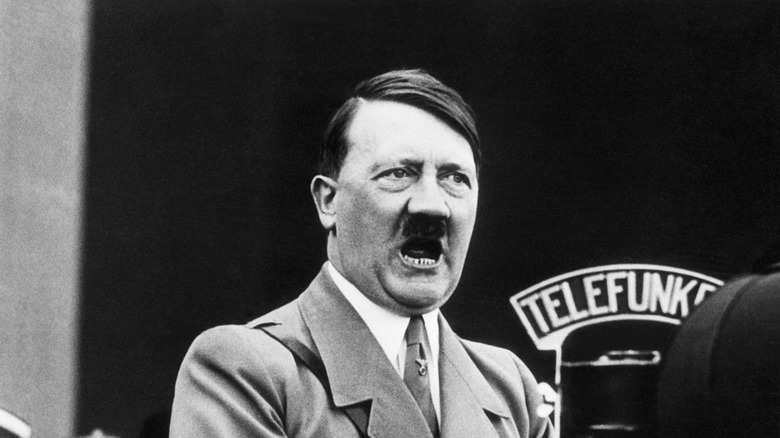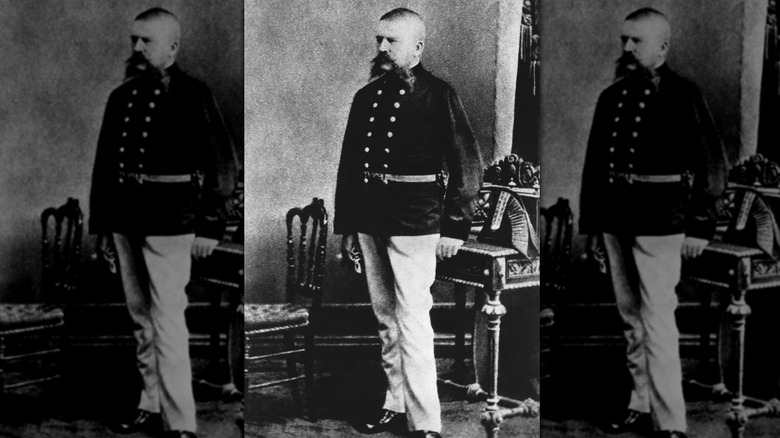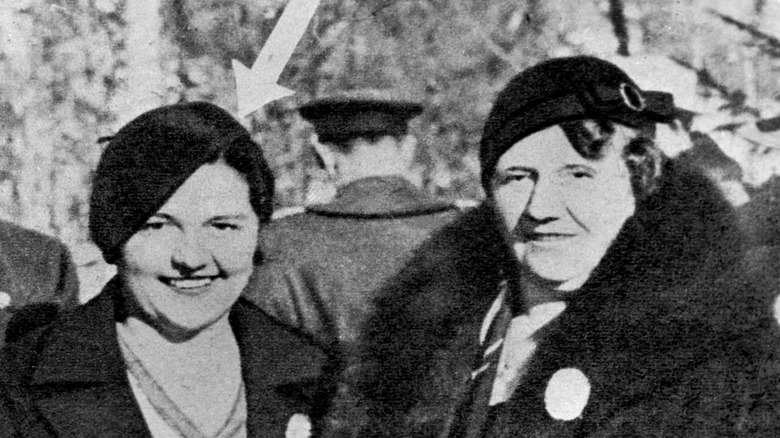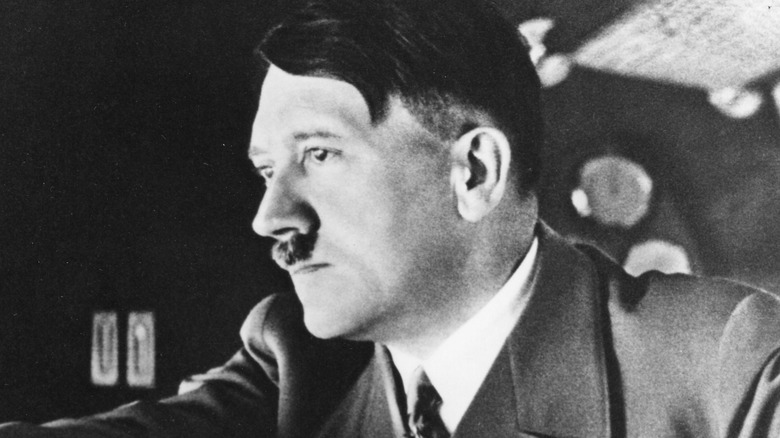Mysteries About Hitler That Are Still Unsolved
Adolf Hitler's ignominious death at his own hands as his mad dreams for Germany and Europe collapsed outside his bunker put an end to his life story. But almost 80 years out from his death, Hitler's place in the world's collective psyche is unshaken. He's one of the darkest personifications of humanity's worst potential from the 20th century — of all our known history. The iconography and statecraft of Nazism are so strong that they're an easy go-to as a representation of the totalitarian state, and Hitler's own theatrics make him a distinctive figure in nightmares — and in ridicule.
Being among the most consequential people and political movements in world history, Hitler and the Nazis have also continued to fuel rumors and conspiracy theories. Legends about Nazi gold sunk in an alpine lake still attract treasure hunters. Hitler's alleged interest in the occult is still a popular motif in fiction, even if he cared much less about the mystical than some of his followers. And there's just no putting down the claim that he fled to Argentina and started a new life, no matter how many times it's debunked.
But Hitler left more behind than a diabolical image and a pile of hearsay. There are questions about his life that have never been fully answered, and some of those feed into the conspiracy theories that still swirl around the history of the Third Reich. From his ancestry to his state of mind in his final days, here are some lingering mysteries about Adolf Hitler.
Who was Hitler's grandfather?
Among the most persistent myths about Adolf Hitler is that he was, to his own shame and horror, part Jewish. The claim goes back to 1953 and Hitler's lawyer, Hans Frank. He had little in the way of evidence, and none has emerged since to suggest there's anything to the story. But this myth has had room to grow thanks to a genuine question about Hitler's ancestry: the identity of his paternal grandfather.
Hitler's father, Alois Schicklgruber, (pictured) was an illegitimate son. His original surname was his mother's. The circumstances of Alois's birth meant little in the Austrian countryside, but in 1876, well into his adulthood, he adopted the surname of his stepfather, Johann Georg Hiedler (corrupted to "Hitler" on government paperwork). Johann Georg married Alois's mother when Alois was 5, and after her death, Alois lived with his step-uncle, Johann Nepomuk. According to Volume 1 of Ian Kershaw's biography, "Hitler 1889-1936: Hubris," it's long been thought by historians that one of the Johann's was in fact Alois's biological father; that one of them had an affair with the boy's mother, never acknowledged paternity to avoid a scandal, but still brought the woman and her child into the family.
Had Johann Nepomuk been Alois's father, there would have been a double scandal for Hitler; he was married when Alois was born, and he was the maternal grandfather of Hitler's mother, per The Washington Post. Hitler himself recognized Johann Georg as his father's father. But it's impossible at this point to know if the Hiedler's really did father Alois, or if Hitler's grandfather is some unknown name.
What happened to Geli Raubal?
Popular history and pop culture have only remembered one name among Adolf Hitler's lovers: Eva Braun. But Hitler had several lovers throughout his life, all of them leading lives marked by tragedy. One of them, almost 20 years his junior, may have been his half-niece, Angela "Geli" Raubal, whom Braun reportedly resembled and whose death has remained an open and disturbing question.
Whether Raubal really was her uncle's mistress is among the mysteries surrounding her. Hitler was certainly fond of her, beyond what one might expect from a typical familial relationship. Compared to his other relationships, where he treated women as adornments and froze them out of a central role in his inner circle, Hitler was devoted, even dependent, upon Raubal. He was also incredibly controlling over her life in the years she and her mother lived with him. Hitler angrily dismissed his chauffeur and bodyguard when he learned that Raubal was having an affair with him. But any sexual component to Hitler and Raubal's relationship, though the subject of rumor and gossip, was never confirmed.
Raubal died in 1931, at age 23, from a gunshot wound inflicted by Hitler's pistol in his apartment while he was out of town. The Nazis declared it an accident, and Hitler appeared grief-stricken for weeks afterward. But Raubal's death was a massive scandal in Germany, with reams of print devoted to the story and the possibility that Hitler had murdered his niece. He responded with a defensive letter to Münchner Post. Suicide after years of unbearable control at Hitler's hands seems the likeliest explanation, but could not and cannot be conclusively proven.
What was the state of Hitler's mental health?
There's a reluctance among some historians and writers to let Adolf Hitler be "just" evil. There's an assumption, a compulsion even, to link his dangerous and destructive personality and actions to a clinical, verifiable disorder. Since his death, there have been myriad efforts to pin Hitler down to a specific mental health condition. He's been diagnosed as suffering from a "spiritual pathology," a sort of messianic zeal unmoored from morality. He's been diagnosed with narcissistic personality disorder. It's been suggested that he suffered from borderline personality disorder, sadistic personality disorder, or schizophrenia.
To try and diagnose anyone without examining them is in violation of the Goldwater Rule of the American Psychiatric Association. Beyond the ethical issue of diagnosing someone you've never met, such diagnoses are often inaccurate and harmful to psychiatry as a profession. With the dead unable to sit for examination, the whole idea of probing someone like Hitler's mind can seem a fool's errand. Some who have tried have rejected any easy classification of Hitler, and they've also found insufficient evidence for him suffering any mental illness; his deeds seem to be those of a sound, but malevolent, mind.
But Hitler did sit for psychiatric evaluation at least once, in a prison cell in 1924 (widespread rumors that he was evaluated after World War I have largely been dismissed). The doctor, Alois Maria Ott, labeled Hitler a "hysteric and pathological psychopath" (via the Psychiatric Times). Ott's empathetic approach reportedly talked Hitler down from a hunger strike and (unsuccessfully) challenged his prejudices. But his work with Hitler was never repeated and remains obscure.



